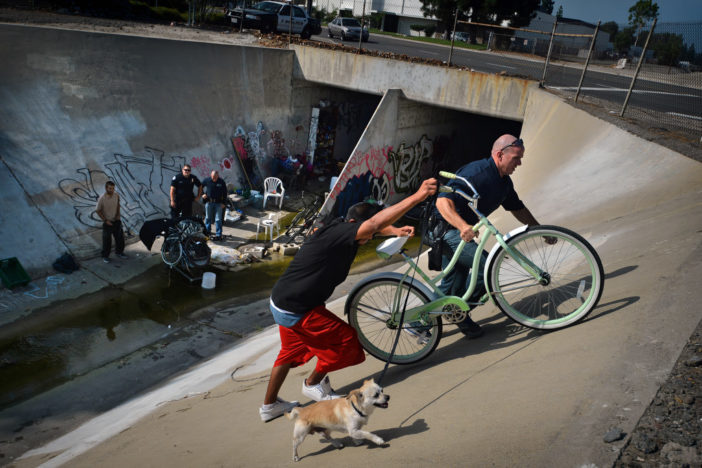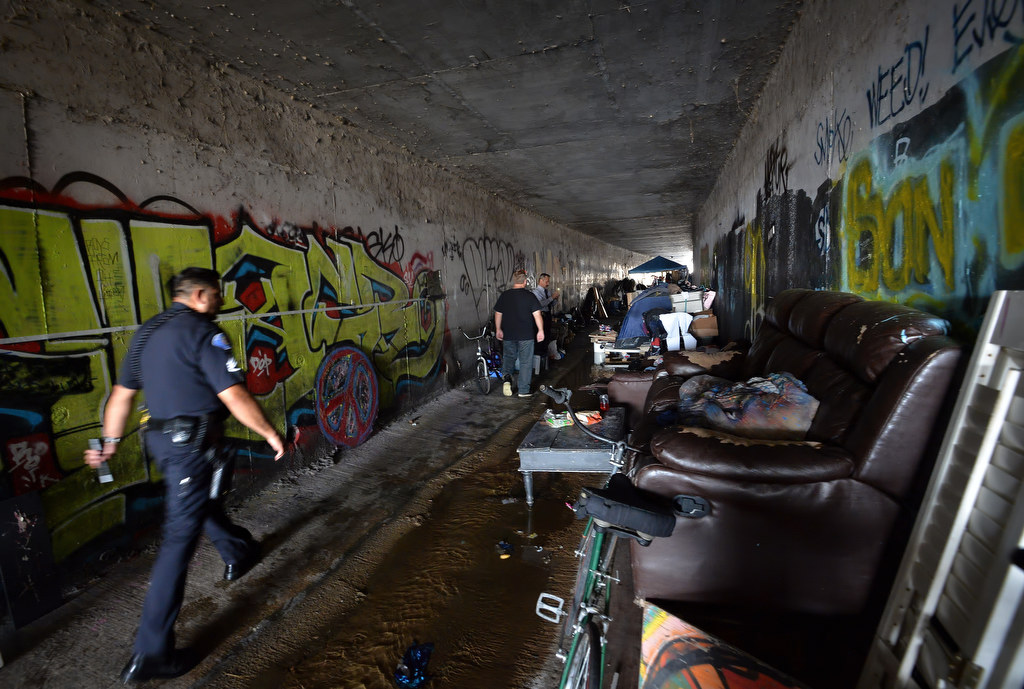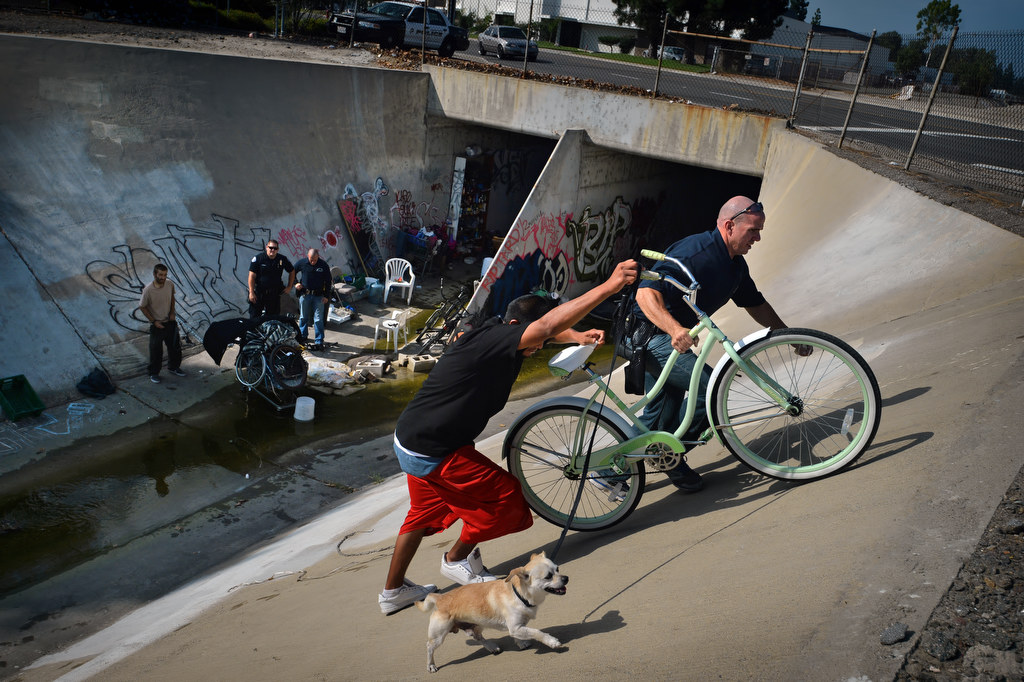A “Godzilla” El Nino is on its way, weather forecasters warn. And there is no segment of the population more in danger of flash floods than the homeless.
This worries Brian Hatfield.
The Garden Grove patrol officer has several family members who struggle with mental illness. One of them wound up briefly homeless.
“I’ve (been touched by mental illness) all my life,” he says. “So I know what support for these people means. How quickly things can break down without support.”
And the next thing you know you’re setting up camp in a flood control channel — a perfect place to be swept away in a rainstorm.
It already happened this past July.
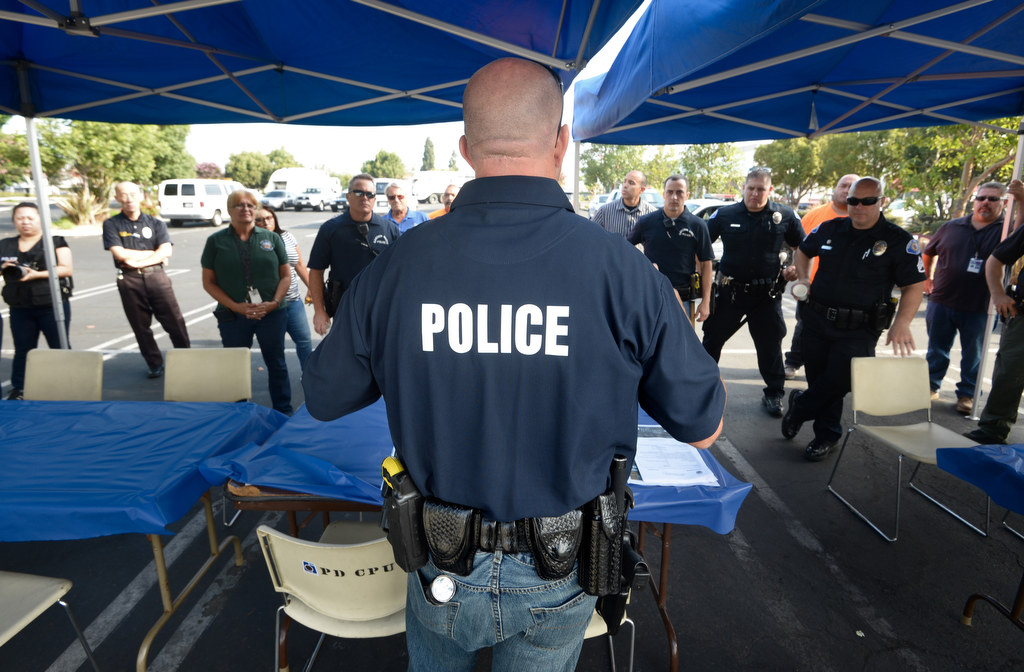
Garden Grove PD Officer Brian Hatfield briefs the task force on how to handle the homeless with respect before walking down to the flood channels behind Calvary Chapel on Knott Avenue where the homeless are living. The tents and tables set up ahead of time were so the health care professionals could talk to the homeless about services available to them.
Photo by Steven Georges/Behind the Badge OC
One day Hatfield was talking to a homeless man he had become friendly with. Two days later he learned that the guy had washed up in Seal Beach, apparently swept out of the culvert in a flash flood from the freak rainstorm that hit Orange County. Last year, two homeless men living in Anaheim washed up in Huntington Beach.
Garden Grove Police spokesman Lt. Bob Bogue said the department’s goal is to form a task force dedicated to the homeless population, which generates about 40 percent of all calls for service. But with no funding right now, limited manpower and a predicted El Nino on its way, Hatfield felt like it was time to move.
“I don’t want to see any more loss of life,” he says. “There are families out there hurting.”
He got the green light from his supervisor, and then spent the next 45 days planning a Homeless Outreach day to help people living in the flood control channel east of Knott Avenue between Lampson Avenue and the 22 Freeway.
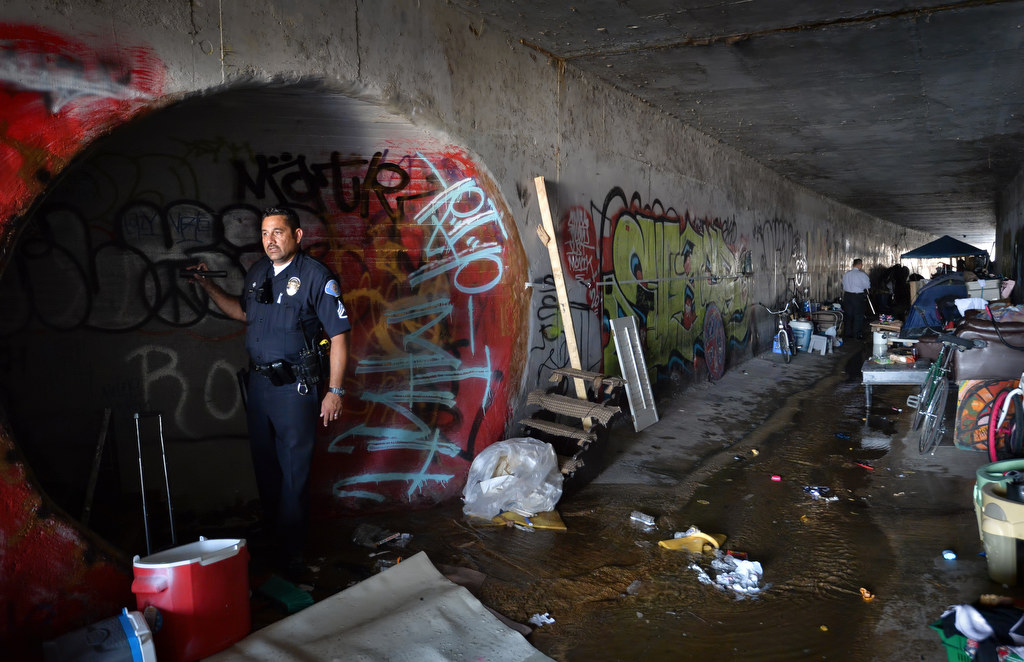
Garden Grove PD Sgt. Richard Burillo looks down a side drainage channel where a bedroom was set up under Knott Street, where some homeless people recently were moved out.
Photo by Steven Georges/Behind the Badge OC
Hatfield rounded up social workers, mental health professionals, veteran affairs workers, and, since the concrete channel is technically county property, a county public works clean-up crew and members of the Orange County Sheriff’s Department. The goal: To link as many people as possible to resources that could potentially get them out of the channel.
On a recent Saturday morning in August, the team set up tents and tables and a box of hot Starbucks coffee in the parking lot at Calvary Chapel Westgrove off Knott Street. From there, police officers walked down into the concrete culvert.
One sprawling camp was furnished with white plastic chairs, bedding, bicycles, book shelves, a mirror, shopping carts filled with clothes and two little dogs. A total of 16 men and women were told to gather up their personal belongings and meet in the parking lot up above; the county would be along shortly to haul off whatever else was left.
Besides serving as a campsite out of the pubic eye, the flood control channel is a human highway; a way for the homeless to move about the city without attracting attention.
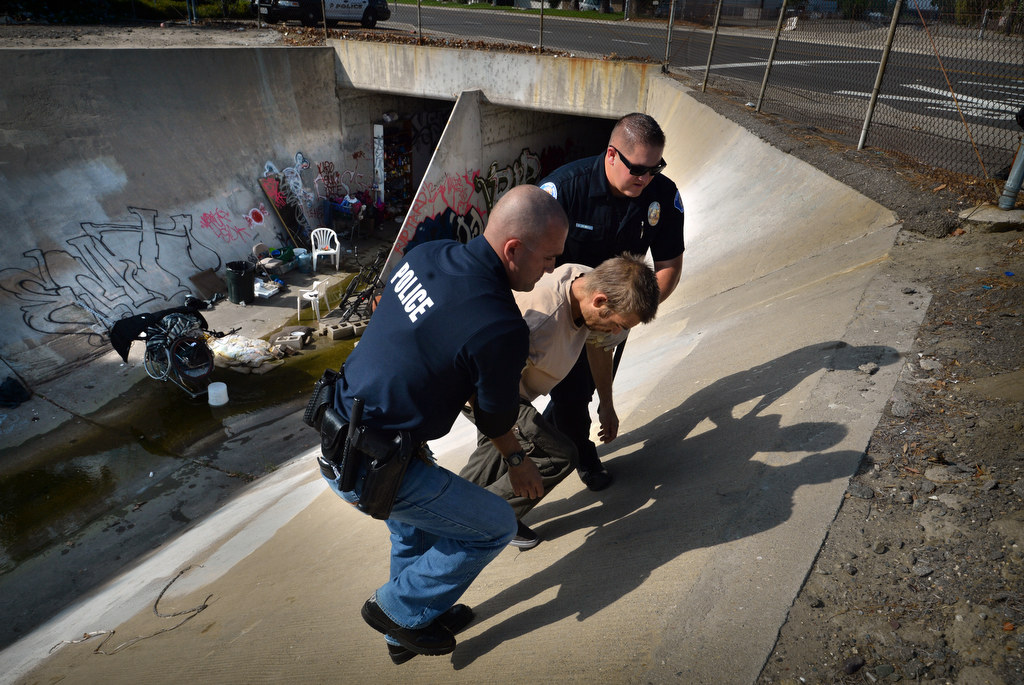
Garden Grove PD officers help a homeless man living in a flood canal under Western Avenue up a steep embankment.
Photo by Steven Georges/Behind the Badge OC
Hatfield didn’t need any introductions. He already knew everyone by name.
“I’m here every week down in some channel,” he says. “Ninety percent of my contact is just being human with them. I tell them, ‘This is just a monkey suit. I’m a man, too.’ You take the cop out of the scenario, treat them like humans, like everyone else walking down the street, and that respect is returned.”
He doesn’t get too caught up in WHY someone is on the streets.
“You know what? It’s a hundred different reasons,” he says. “I’m not here to judge.”
He says he is there for two reasons only.
“To educate them on violations of the law. And help them seek assistance to get out of the channel.”
But it’s their choice.

Candice Mello, a homeless woman who has been living in the flood channel under Western Avenue for a few months, gives her dog Spaz a hug while she talks to health care professionals about her options after the Garden Grove Homeless Task Force recently moved her and others out out of the area.
Photo by Steven Georges/Behind the Badge OC
“I’m not trying to make them have a home. But I can create that bridge. I will pave the road for that person. I cannot make them walk it.”
On Saturday, Candice Mello wasn’t convinced she was ready to take the walk. She and her boyfriend and little dog Spaz were talking to social workers under a tent. Did they want to go to a shelter? Not unless the couple could go to the same one. And they couldn’t go together unless they were married. Did they want to get married? “It costs money to get married,” she replied.
Mello, who was sharing a water bottle with her dog, said the couple once had a condo in Huntington Beach but it was foreclosed on.
“We were doing good, and then we lost it,” she said. That was two years ago. They’ve been outdoors ever since.
Hatfield has helped others take the walk, though.
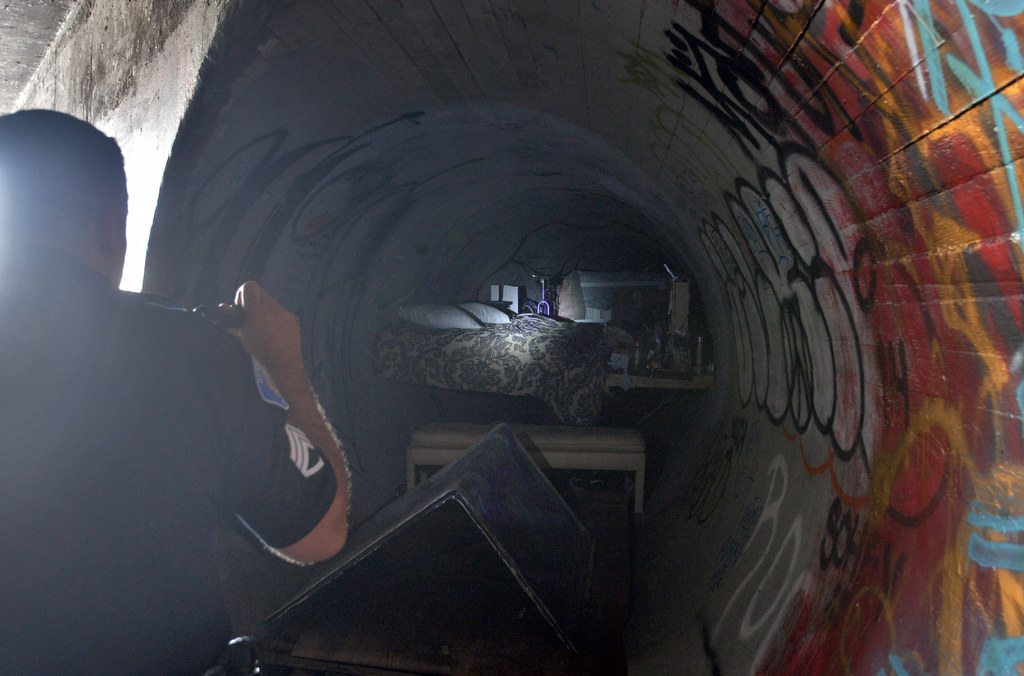
Garden Grove PD Sgt. Richard Burillo looks down a side drainage channel where a bedroom was set up under Knott Street.
Photo by Steven Georges/Behind the Badge OC
One day he was driving down the road in his patrol car when he saw a driver flip a U turn and start following him. Hatfield pulled over and the other car followed. The driver got out. “Officer Hatfield!” he yelled, approaching to shake his hand.
It took Hatfield a moment to realize that the man was a veteran he had helped get into rehab a few months before. He didn’t recognize him all cleaned up.
“If one person takes that step forward today, everything I’ve done for the last 45 days — all this — was a success to me,” he says.
As it turns out, more than one person took a step forward.
The final tally: Two women agreed to seek assistance with transitional housing and one man agreed to enter a rehabilitation program, according to Bogue. An Air Force veteran was also directed to the Veterans Assistance Program for help.
Toward the end of the morning, a man walked up to shake Hatfield’s hand.
“Officer Hatfield, I can’t say enough. Thank you for everything you’ve done, man,” said Matt Twist, who has been on the street for nearly a year. “I appreciate all your hard work. It means a lot to me. God bless you. Thanks for helping us out.”
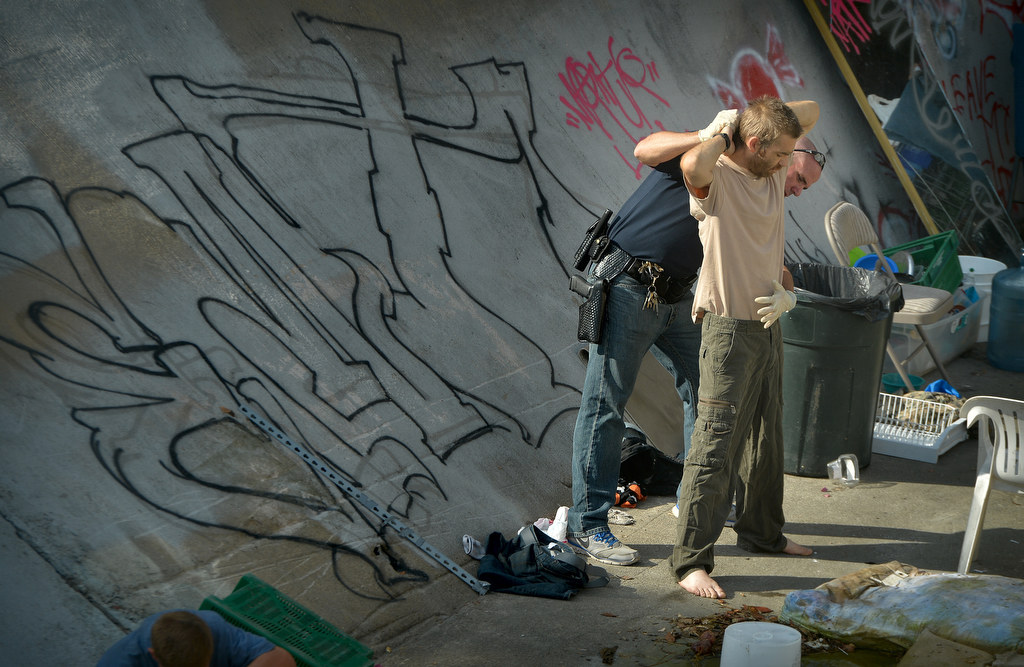
The Garden Grove Police perform a search of a homeless man for safety reasons but did not place anyone in handcuffs or under arrest as the Garden Grove Homeless Task Force conducted a clean-up sweep of people living in the flood channel under Western Avenue in Garden Grove.
Photo by Steven Georges/Behind the Badge OC
Twist said he was ready to go get some help and try to get back on his feet.
“I’d like to keep in touch with you.”
He then saluted Hatfield and sauntered off across parking lot with a list of phone numbers for resources in his hand.
Said Hatfield: “Law enforcement’s role in the community has changed.”

Matt Twist, a former heavy equipment operator who has been living in the flood channel under Western Avenue for about 10 months, gets some coffee as he talks to health care professionals about his options after he and others where moved out of the area.
Photo by Steven Georges/Behind the Badge OC
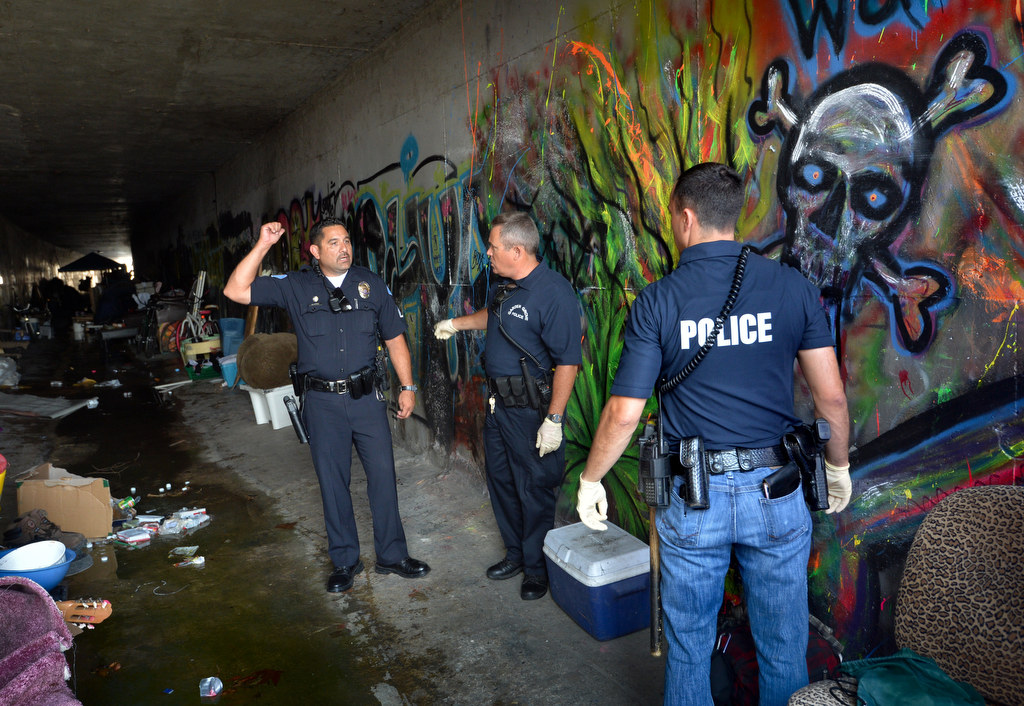
Garden Grove PD officers inspect a flood channel under Knott Street after the people living there were removed. Police believe the homeless there were not responsible for the graffiti.
Photo by Steven Georges/Behind the Badge OC
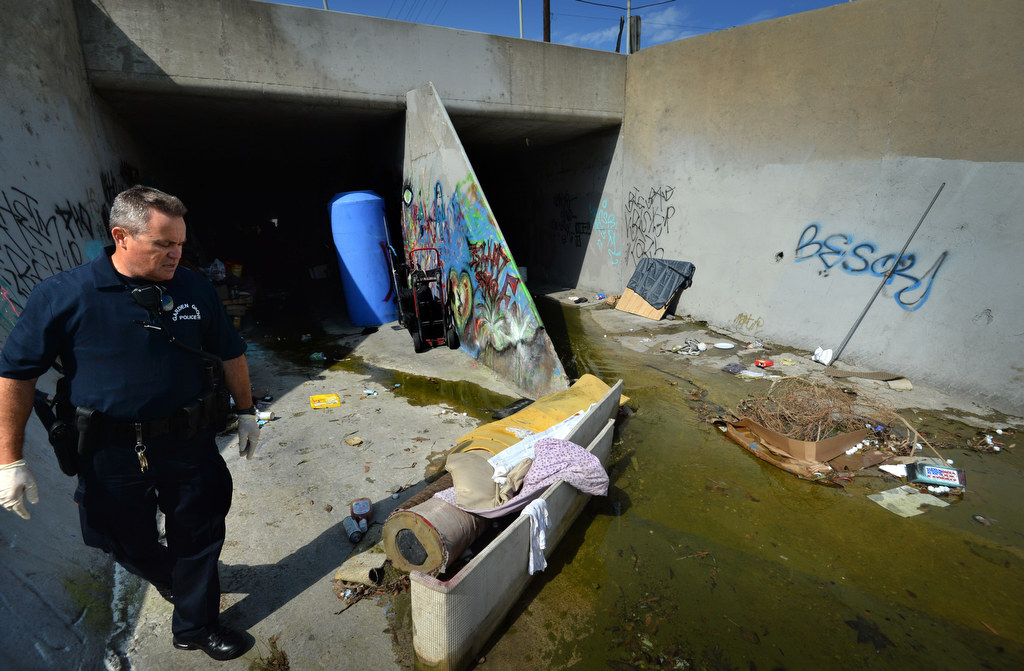
Garden Grove PD Officer Roger Flanders walks past a makeshift damn in an attempt to get the water to divert to the other side of the flood channel under Knott Street. Photo by Steven Georges/Behind the Badge OC
 Behind the Badge
Behind the Badge
